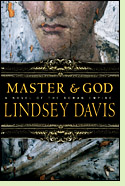Master and God
by Lindsey Davis
Reviewed by David Maclaine

Master and God offers a languid stroll through the streets of Flavian Rome. Although clearly based on a great deal of thorough research, particularly on Roman architecture, the novel unfortunately fails to convey the historical background in an engaging way that might kindle readers' interest in the period. I was able to forge through to the end, but with a growing sense of frustration and puzzlement.
Davis is an experienced writer with a number of novels to her name, including the popular Falco mystery series, so she must be aware of the advice every tyro receives to “Show, don’t tell!” Master and God ignores this dictum for page after page after page, instead lecturing readers with summarized conclusions, such as: "In giving back the stolen site for public use Vespasian had imposed benign rulership in place of maniacal despotism." The novel further ignores the sound advice to let readers know early on what the story will be about. It should not take 130 pages for them to decide they are reading a love story of sorts between a hairdresser and a praetorian rather than a Fodor’s Guide to Flavian Rome. Some dramatic events occur - a big fire, a diagnosis of Emperor Domitian as "paranoid" by a Greek doctor, an assassination - but the focus is fitful and odd, giving five pages to the viewpoint of a fly in Domitian’s quarters, two pages more than the crucial battle that lands one of the lovers in a harsh captivity. The reader's illusion of being transported into the time of the novel is repeatedly broken by descriptions of what “would” happen in the future. Expressions such as “odd bods,” “canoodling,” “kerfuffle,” “collywoddles,” “hoiked” and “smackeroo bonanza” jerk readers into the cheap, chatty world of the modern gossip pages, which, sadly, offer far more excitement than this novel. (2012, 464 pages)
More about Master and God at Powell's Books, Amazon.comOther novels set in Flavian Rome:
The Course of Honour by Lindsey Davis (1997), about Emperor Vespasian's mistress. More info
Mistress of Rome by Kate Quinn (2010), about a Jewish slave girl in first-century Rome who falls in love with a gladiator but becomes the mistress of the Emperor Domitian; #1 in the Mistress of Rome series. More info
Josephus by Lion Feuchtwanger (1932), , about the first century Jewish historian Josephus during the years when he visits Rome, then witnesses the fall of Jerusalem in 70 A.D.; #1 in the Josephus trilogy. See review or more info at Amazon.com
Nonfiction about Flavian Rome:
Lives of the Caesars by Suetonius (121 A.D.), a lively, gossipy account of the lives of the rulers of Rome from Julius to Domitian (the last three, Vespasian, Titus and Domitian were the Flavian Emperors). More info
Vespasian by Barbara Levick (1999). More info
Domitian: Tragic Tyrant by Pat Southern (1997). More info
Online:
The Flavian Dynasty (69-96) at the Metropolitan Museum website
Back to Novels of Ancient History
Back to Directory of Book Reviews